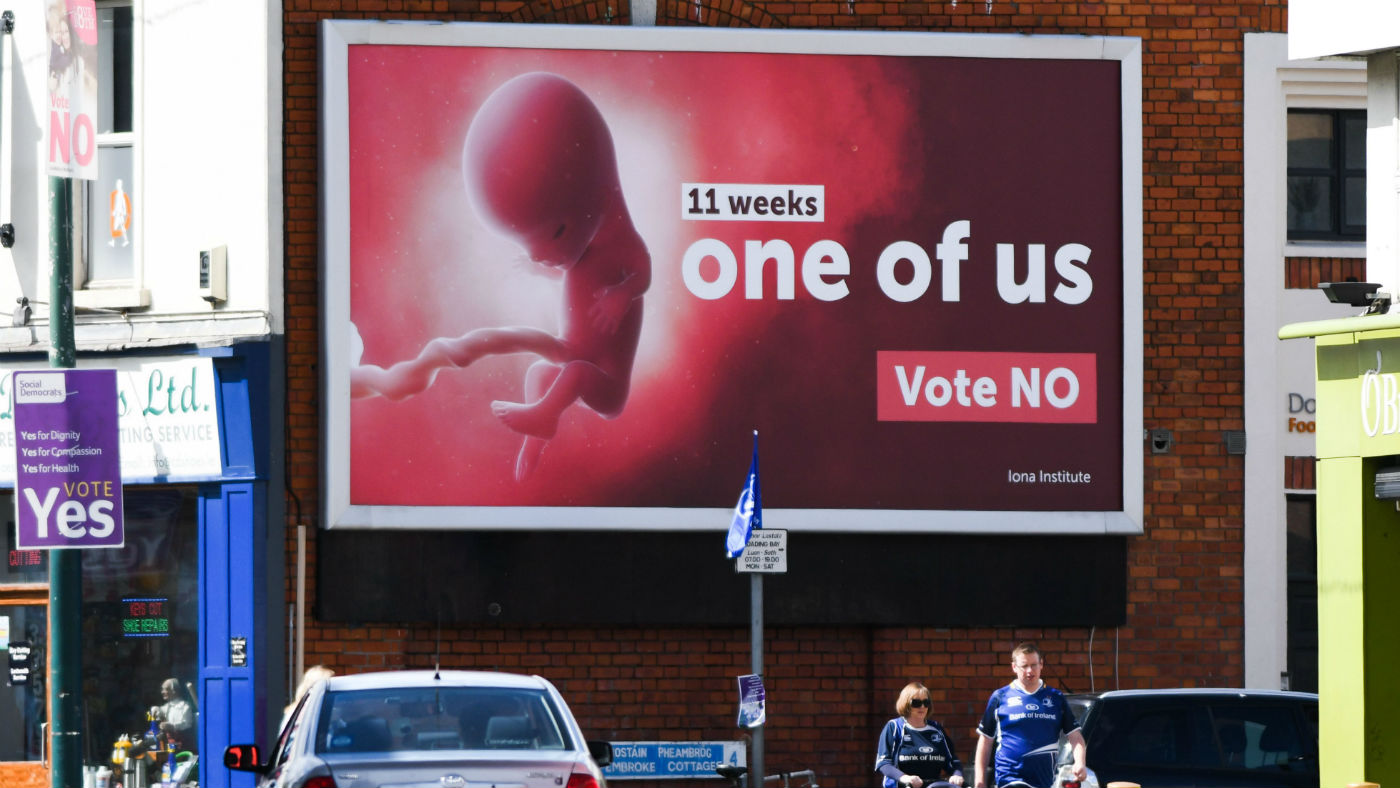Ireland abortion referendum goes down to the wire
Undecideds hold the key as Yes campaign sees lead disappear

A free daily email with the biggest news stories of the day – and the best features from TheWeek.com
You are now subscribed
Your newsletter sign-up was successful
Polls for this Friday’s referendum on legalising abortion in Ireland show support for the No campaign gaining ground, with the one in five voters still undecided holding the key to which side will win out.
It means that a result once nearly taken for granted “now hangs in the balance”, says The Guardian, as the media comes under fierce attack for bias and questions swirl about foreign influence and online ads.
Driven by the powerful Catholic Church, Ireland has the strictest controls on abortion of any western country – dating back to a 1980s amendment in the constitution which enshrined a near-total ban on all terminations.
The Week
Escape your echo chamber. Get the facts behind the news, plus analysis from multiple perspectives.

Sign up for The Week's Free Newsletters
From our morning news briefing to a weekly Good News Newsletter, get the best of The Week delivered directly to your inbox.
From our morning news briefing to a weekly Good News Newsletter, get the best of The Week delivered directly to your inbox.
A woman convicted of having an illegal termination faces up to 14 years imprisonment.
It had been thought a growing urban and younger demographic had decisively shifted support in favour of repealing the amendment, but rural, religious and older voters have mobilised to put a Yes vote in jeopardy.
Friday’s vote is the first major plebiscite in a western country since the Cambridge Analytica scandal shone a light on the sometimes nefarious tactics used to micro-target potential swing voters.
Following allegations of foreign interference in the 2016 Brexit vote and US presidential election, US tech giants have moved to change the rules on political advertising in the run up to the referendum.
A free daily email with the biggest news stories of the day – and the best features from TheWeek.com
Google has banned all adverts linked to the vote, while Facebook has barred foreign groups from paying for ads, and introduced a new transparency tool so anyone in Ireland can track advertisements online.
The move has been criticised by No campaigners, who say they were relying on social media to bypass the conventional mainstream news outlets which they claim are bias in favour of a change in the law.
-
 Health insurance: Premiums soar as ACA subsidies end
Health insurance: Premiums soar as ACA subsidies endFeature 1.4 million people have dropped coverage
-
 Anthropic: AI triggers the ‘SaaSpocalypse’
Anthropic: AI triggers the ‘SaaSpocalypse’Feature A grim reaper for software services?
-
 NIH director Bhattacharya tapped as acting CDC head
NIH director Bhattacharya tapped as acting CDC headSpeed Read Jay Bhattacharya, a critic of the CDC’s Covid-19 response, will now lead the Centers for Disease Control and Prevention
-
 Epstein files topple law CEO, roil UK government
Epstein files topple law CEO, roil UK governmentSpeed Read Peter Mandelson, Britain’s former ambassador to the US, is caught up in the scandal
-
 Iran and US prepare to meet after skirmishes
Iran and US prepare to meet after skirmishesSpeed Read The incident comes amid heightened tensions in the Middle East
-
 Israel retrieves final hostage’s body from Gaza
Israel retrieves final hostage’s body from GazaSpeed Read The 24-year-old police officer was killed during the initial Hamas attack
-
 China’s Xi targets top general in growing purge
China’s Xi targets top general in growing purgeSpeed Read Zhang Youxia is being investigated over ‘grave violations’ of the law
-
 Panama and Canada are negotiating over a crucial copper mine
Panama and Canada are negotiating over a crucial copper mineIn the Spotlight Panama is set to make a final decision on the mine this summer
-
 Why Greenland’s natural resources are nearly impossible to mine
Why Greenland’s natural resources are nearly impossible to mineThe Explainer The country’s natural landscape makes the task extremely difficult
-
 Iran cuts internet as protests escalate
Iran cuts internet as protests escalateSpeed Reada Government buildings across the country have been set on fire
-
 US nabs ‘shadow’ tanker claimed by Russia
US nabs ‘shadow’ tanker claimed by RussiaSpeed Read The ship was one of two vessels seized by the US military